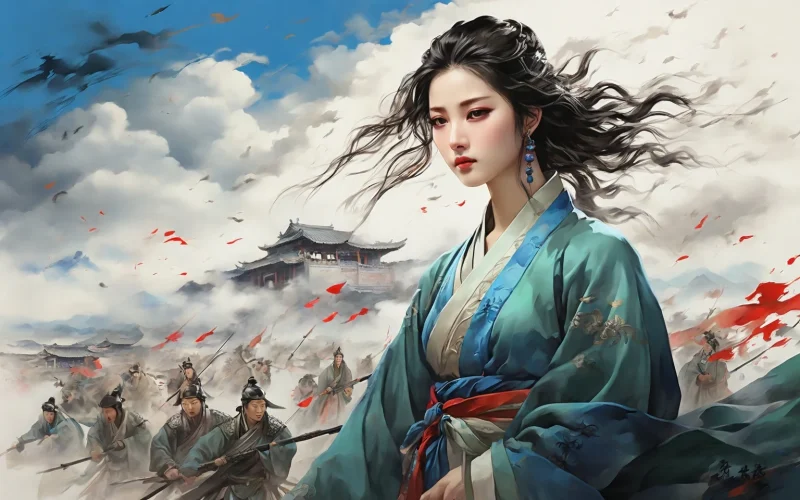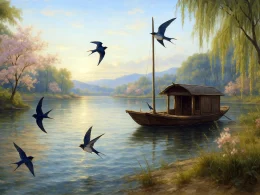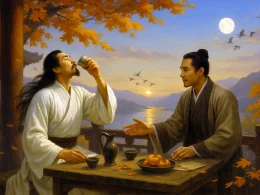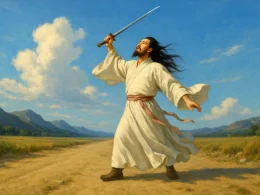The kings in history sank so low
As to appease by marriage the foe.
To rule is a sovereign's duty.
Can safety depend on a beauty?
Could a face beautiful as jade
Repel the Tartars who invade?
Why were no loyal generals found
Among bones buried underground?
Original Poem
「咏史」
戎昱
汉家青史上,计拙是和亲。
社稷依明主,安危托妇人。
岂能将玉貌,便拟静胡尘。
地下千年骨,谁为辅佐臣。
Interpretation
Written during the tumultuous years following the An Lushan Rebellion (755-763 AD), this poem critiques the Tang court's reliance on diplomatic marriages to pacify border threats. The poet condemns this policy as both ineffective and humiliating, using Han Dynasty precedents to veil his criticism of contemporary political weakness.
First Couplet: "汉家青史上,计拙是和亲。"
Hàn jiā qīng shǐ shàng, jì zhuō shì hé qīn.
The Han annals in azure pages state: "Marrying off princesses" heads the list of plans irate.
The opening frames imperial marriages (和亲) as historically proven failures. "Azure pages" (青史) symbolize official history's judgment, while "plans irate" conveys the poet's scorn for this recurrent diplomatic folly.
Second Couplet: "社稷依明主,安危托妇人。"
Shè jì yī míng zhǔ, ān wēi tuō fù rén.
A nation's fate hangs on its sovereign's light, Yet you entrust its safety to a woman's slight?
This razor-sharp indictment contrasts the Confucian ideal of wise rulership (明主) with the absurdity of relying on women's bridal veils for national security. The verb "entrust" (托) drips with sarcasm.
Third Couplet: "岂能将玉貌,便拟静胡尘。"
Qǐ néng jiāng yù mào, biàn nǐ jìng hú chén.
How can jade-like beauty's transient glow Quell the Tartar dust storms that endlessly blow?
The rhetorical question demolishes the policy's logic: female beauty (玉貌) versus relentless nomadic incursions (胡尘). The "dust storms" metaphor suggests both cavalry forces and cultural contamination.
Fourth Couplet: "地下千年骨,谁为辅佐臣。"
Dì xià qiān nián gǔ, shuí wéi fǔ zuǒ chén.
Beneath the earth, bones of millennia ask: "Where are the ministers fit for their task?"
The closing cry transcends centuries, accusing current officials of failing their ancestors. "Bones of millennia" (千年骨) represent the unquiet dead of past dynasties that similarly collapsed due to weak leadership.
Holistic Appreciation
Focusing on the policy of "marriage alliances," this poem critiques the humiliating strategies of the Han Dynasty to satirize similar practices in the Tang Dynasty, revealing the poet's profound concern for his nation's fate. The verses are structured with clear progression, conveying impassioned emotion—from exposing the absurdity of diplomatic marriages to lamenting the incompetence of the court—each line sharp and incisive. At the same time, the poet's anxiety about reality and his pursuit of ideals are vividly expressed, blending fierce criticism with intense patriotism.
Artistic Merits
- Historical Analogy as Satire: By invoking Han Dynasty history to critique Tang realities, the poet strengthens his ironic thrust through allegorical depth.
- Concise Language, Direct Emotion: The verses are piercingly candid, with unambiguous criticism and unrestrained intensity, devoid of embellishment.
- Logical Progression: Beginning with condemnation of marriage alliances, the poem systematically unveils the political ineptitude and dereliction of power behind them, demonstrating tight reasoning and clear structure.
Insights
This poem articulates the poet's longing for national strength and his expectations of responsibility for rulers and ministers. It reminds future generations that true stability stems from wise governance and internal resilience, not reliance on compromise and humiliating diplomacy. The national dignity and spirit of self-reliance embodied in the poem remain profoundly instructive for contemporary society.
Poem translator
Xu Yuanchong (许渊冲)
About the Poet
Rong Yu (戎昱, 744 - 800), a Tang Dynasty poet, was born in Jingzhou (present-day Jiangling, Hubei). As a representative realist poet of the Mid-Tang period, his works focused on social realities with a somber and unadorned style. He was particularly renowned for his frontier poetry and poems depicting people's livelihoods, vividly portraying the turbulent social landscape of the Mid-Tang era.












